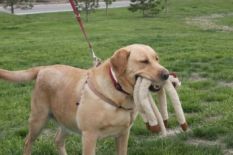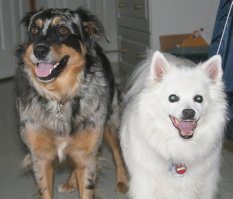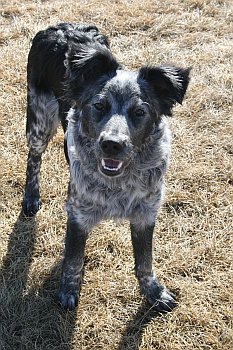
 Dogs are master manipulators... those pleading eyes or a cutely raised paw can quickly convince pet owners to give their pets a "little treat". Unfortunately, those little treats begin to add up - and too many calories can lead to fat dogs.
Dogs are master manipulators... those pleading eyes or a cutely raised paw can quickly convince pet owners to give their pets a "little treat". Unfortunately, those little treats begin to add up - and too many calories can lead to fat dogs.
There's a myth that spaying or neutering your dog makes it fat. This is just an excuse. There are many spayed and neutered pets who are in good body condition. The key is providing your pet with adequate exercise and the appropriate number of calories.
Why bother to go through the hassle of keeping your dog in sleek shape? What's wrong with a few extra pounds? Aside from missing out on the fun of an active dog life (rolling in the grass, romping through the woods, frolicking with other canine friends, etc), obesity can lead to:
Joint problems - the extra weight puts more demand on joints that weren't meant to handle it.
Extra stress on heart and on lungs, which need to work harder.
Breathing problems.
Greater susceptibility to injuries.
Heat intolerance.
Health risks such as diabetes.
Some pet's weight issues may actually be due to medical reasons. In these cases your veterinarian will be able to advise you best on how to keep your pet as healthy as possible.
Otherwise, here are a few ways you can help your dog maintain a healthy body weight:
Use the guides on the back of food packages only as a suggestion. You will need to find the right amount to feed your dog so that he keeps a healthy weight, which may differ from what's stated on the package.
Measure your pet's food. It's easy to feed too much when you're just 'eye-balling' the portion.
Don't "free feed". That is, don't leave food accessible all the time. Many dogs will overeat just because it's available.
Take into account the number of treat(s) you offer your dog. If your dog gets more than the usual treats one day, cut back on the amount you feed him for his next meal.
Ask guests or other pet owners you meet at the park not to give your dog treats unless you okay it first. Once you know how many treats he's had you can adjust his meals accordingly.
Provided your vet says that your dog is in appropriate health, then exercise your dog regularly. It will help to keep your dog's joints lubricated and healthy, and maintain his muscles (note: putting your dog in the yard by himself isn't "exercise"!). Regular exercise is best, rather than the occasional strenuous hike or play time. Exercising your dog will also give you the opportunity to bond with your pet. And it's fun! Watching a dog bounding joyfully down a trail or rolling ecstatically in the grass is a great stress reliever.
Regular exercise and appropriate nutrition will help your four-legged pal to lead a long, healthy, and happy life. .
 What Is a Dog's Age in Human Years?
You have pro
What Is a Dog's Age in Human Years?
You have pro
 Seven Reasons to Adopt a Rescued Pet
Seven Reasons to Adopt a Rescued Pet
 Caring for Your Pet in a Tough Economy
If you’re amo
Caring for Your Pet in a Tough Economy
If you’re amo
 How to Care for Dissolvable Stitches After Spaying
How to Care for Dissolvable Stitches After Spa
How to Care for Dissolvable Stitches After Spaying
How to Care for Dissolvable Stitches After Spa
 How to Care For Newborn Puppies Without a Mother
How to Care For Newborn Puppies Without a Moth
How to Care For Newborn Puppies Without a Mother
How to Care For Newborn Puppies Without a Moth
Copyright © 2005-2016 Pet Information All Rights Reserved
Contact us: www162date@outlook.com